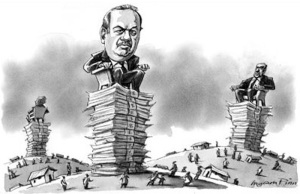Plutocracy and Separateness
First of all, this is not about Trump. This is bigger than Trump. In fact, this is huge.
Part a: Systemic problems. |
 Racism, sexism, homelessness, oil spills, climate change, war, etc. Reformists generally work on just one of those problems by itself, as though it could be cleaned up without changing everything else in our lives. But if you treat the symptoms without addressing the underlying disease, the symptoms will keep coming back, and new symptoms will appear, too.
Racism, sexism, homelessness, oil spills, climate change, war, etc. Reformists generally work on just one of those problems by itself, as though it could be cleaned up without changing everything else in our lives. But if you treat the symptoms without addressing the underlying disease, the symptoms will keep coming back, and new symptoms will appear, too.
What is the underlying disease? I’d say it’s our culture of separateness, but that’s hard to explain. I’ll come back to that later.
A better place to start is plutocracy, rule by the rich. That’s a good approximation, and easier to explain.
 Mostly, I’m recommending the same old tactics — marches, leaflets, viral videos, and so on. But when you go to a rally — for healthcare, Standing Rock, or whatever — carry a sign saying how that problem is caused by plutocracy. And this new campaign requires more educational efforts such as teach-ins.
Mostly, I’m recommending the same old tactics — marches, leaflets, viral videos, and so on. But when you go to a rally — for healthcare, Standing Rock, or whatever — carry a sign saying how that problem is caused by plutocracy. And this new campaign requires more educational efforts such as teach-ins.
Setting a good example is not enough. Brainwashed people may not learn even from their own experience, unless we explain what’s going on.
This educational campaign will broaden our view of all the issues. For instance, homelessness can be ended by a guaranteed basic income, but then anyone could quit a job he hates. That would change the balance of power in every workplace, in ways the owners won’t like.
Part b: Plutocracy is now. |
Some people fear we may soon lose our democracy. But they’re out of date. We’ve already been ruled by the rich for decades or longer. There’s now proof of that:
 In 2014, Gilens and Page, of Princeton and Northwestern, published “Testing Theories of American Politics.” Here is their idea:
In 2014, Gilens and Page, of Princeton and Northwestern, published “Testing Theories of American Politics.” Here is their idea:
This country decides public policy by elections, petitions, lobbying, bribes, assassinations, etc. But those are hard to measure. Let’s put those aside, and just look at which public policies actually get signed into law. Statistically compare those outcomes with the preferences people express in polls.
And here is what Gilens and Page found in decades of data: The rich end up with the policies they want and the rest of us don’t, regardless of elections or other trappings of democracy.
Part c: The plutocrats are monsters. |
Corporations have often paid starvation wages, and beaten or killed union organizers. The cigarette companies knowingly poison millions of people, and lied about it for decades. Exxon has known for decades that its product is wrecking the climate, and that will kill billions.
 And the USA has been at war nearly every year of its history, killing innocent people for lies and profit, not for defense. And as the truth gradually comes out, there are no prosecutions. The wars, the bank bailouts, all the crimes of government have bipartisan support, so most of our politicians are con men, bank robbers, and mass murderers. And yet we treat them with respect, like some national Stockholm Syndrome.
And the USA has been at war nearly every year of its history, killing innocent people for lies and profit, not for defense. And as the truth gradually comes out, there are no prosecutions. The wars, the bank bailouts, all the crimes of government have bipartisan support, so most of our politicians are con men, bank robbers, and mass murderers. And yet we treat them with respect, like some national Stockholm Syndrome.
What can we do about this?
Reformists believe laws could separate legislators from lobbyists, clean up elections, and so on. I have my doubts about that.
After all, it’s the plutocrats who determine which laws get passed and which of those get enforced. They are not likely to vote themselves out of power.
Money IS influence, regardless of what the Supreme Court does or doesn’t say about that. The only way to avoid rule by the wealthy class is to not have a wealthy class. But that requires big changes in our economic system.
Part d: Radical economics. |
 Economic inequality in the world today is enormous. The richest sixpeople now have as much wealth as the poorest 3.7 billion people.
Economic inequality in the world today is enormous. The richest sixpeople now have as much wealth as the poorest 3.7 billion people.
An imbalance this big didn’t just “happen.” We need to change something really basic in our standard operating procedures.
I think I’ve figured out what it is. You can see it in the board game “Monopoly,” which always ends with all the players but one totally impoverished. It doesn’t depend on cheating, though certainly that would speed things up. It just depends on private property, as I’ll explain.
And I’m not saying give away all your property tomorrow. Most of us, including me, don’t know how to live without private property. We need to figure that out together, and I’m now going to explain why.
If we don’t share, we trade — for food, labor, rent, whatever. That looks harmless, because it’s voluntary; we trade only when it helps us both. But it doesn’t help us both equally.
 Suppose I’m wealthier than you. I have lots of options. I could find someone else to trade with. I could trade some other day. Whereas you — you’re poor, you’re desperate, your child is sick, your rent is due, you need this trade right now.
Suppose I’m wealthier than you. I have lots of options. I could find someone else to trade with. I could trade some other day. Whereas you — you’re poor, you’re desperate, your child is sick, your rent is due, you need this trade right now.
Evidently I’m in the stronger bargaining position; I can set the terms of the trade. Probably I’ll set them to help me as much as possible, though that may help you very little. And that’s how inequality grows.
 Another drawback of trade is externalized cost. That’s the side effect on someone other than the traders. It includes war and ecocide.
Another drawback of trade is externalized cost. That’s the side effect on someone other than the traders. It includes war and ecocide.
Part e: The psychology of separateness. |
 The problem is not just in our rulers, but in our culture, in all of us. You keep your stuff in your house, I keep my stuff in my house, and that’s the so-called “American dream.” But that separates us, so I don’t need to care about you. In fact, I can’t afford to care about you, because the system makes me competeagainst you. Your loss may be my gain. It’s an unfriendly culture.
The problem is not just in our rulers, but in our culture, in all of us. You keep your stuff in your house, I keep my stuff in my house, and that’s the so-called “American dream.” But that separates us, so I don’t need to care about you. In fact, I can’t afford to care about you, because the system makes me competeagainst you. Your loss may be my gain. It’s an unfriendly culture.
Baboon culture generally is unfriendly too. Primatologist Robert Sapolsky has a Youtube that begins with a big baboon hitting another baboon, who swats a smaller one, and so on. Each baboon except the last gets to feel a little control over his life.
Maybe that desire for control is why, in our own society, there is so much bullying — sexism, racism, nationalism, and just random shootings.
 Power corrupts. That was finally proved in 1971 by Zimbardo’s Prison Experiment. Student volunteers were tested for normalcy, then divided randomly into guards and inmates for a two-week mock prison. Within six days the guards were abusing the inmates so severely that the experiment was halted.
Power corrupts. That was finally proved in 1971 by Zimbardo’s Prison Experiment. Student volunteers were tested for normalcy, then divided randomly into guards and inmates for a two-week mock prison. Within six days the guards were abusing the inmates so severely that the experiment was halted.
Outside of experiments, in real life, we see power corrupting at every level. Bosses bully their workers, guards torture their captives, police shoot the poor, and the rich start wars to make themselves richer.
I don’t think all this cruelty is inherent in human nature. It’s just our current culture.
Later in Sapolsky’s baboon video, he talks about one group of baboons that accidentally changed to a culture of friendship, of not hitting. If baboons can change their culture accidentally, then we humans can change oursintentionally.
It would help if people learned a bit more about psychology. They’d be less inclined toward hierarchy if they knew about Zimbardo’s and Sapolsky’s work. They’d obey, conform, or punish less readily if they knew about Milgram‘s obedience experiment, Asch‘s conformity experiment, and Johnson‘s punishment experiment. And they wouldn’t focus so much on money if they heard Pink and Kohn on extrinsic motivation.
 And separateness makes technology dangerous. Soon some suicidal madman may build his own germ warfare lab and kill us all.
And separateness makes technology dangerous. Soon some suicidal madman may build his own germ warfare lab and kill us all.
 We’ll only be safe in a world where no one wants to hurt us. Let’s make a culture of caring and sharing that leaves no one behind.
We’ll only be safe in a world where no one wants to hurt us. Let’s make a culture of caring and sharing that leaves no one behind.
2017 Feb 25 version 6.40. Jump to: Part a: Systemic problems ● Part b: Plutocracy is now ● Part c: The plutocrats are monsters ● Part d: Radical economics ● Part e: The psychology of separateness
About the author Eric is an American mathematician, retired from Vanderbilt University with the title of Professor Emeritus. His interests started primarily in analysis but moved into mathematical logic. Schechter is best known for his 1996 book Handbook of Analysis and its Foundations, which provides a novel approach to mathematical analysis and related topics at the graduate level. In retirement he has become a full-time political activist and radical educator. His conversion to anti-capitalism in recent years transformed Eric’s life. By temperament a progressive and iconoclast, his study of social and environmental conditions, domestic and international, rapidly led him through various stages from standard liberalism to a far more radical critique of the corporate status quo, which he regards as unreformable.
* Eric’s main blog—Eric’s Rants—is at http://leftymathprof.wordpress.com
* Eric’s main blog—Eric’s Rants—is at http://leftymathprof.wordpress.com
 What will it take to bring America to live according to its own self image?
What will it take to bring America to live according to its own self image?


